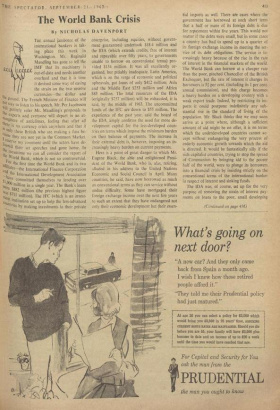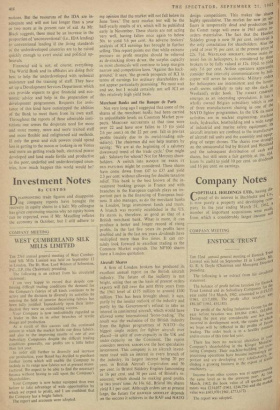The World Bank Crisis
By NICHOLAS DAVENPORT
Tile annual jamboree of the international bankers is tak- ing place this week in Washington. Mr. Reginald. Maudling has gone to tell the IMF that its machinery is out-of-date and needs another overhaul and that it is time it devised some way of easing the strain on the two reserve currencies--the dollar and the Pound. The French Minister of Finance will not stay to listen to his speech. Mr. Per Jacobsson will Politely refer Mr. Maudling's proposals to the experts and everyone will depart in an at- tilesPhere of anticlimax, feeling that after all ti,i:ere is no currency crisis anywhere and that it Only these British who are making a fuss be- cause they are not yet in the Common Market, / reserve my comment until the actors have de- p,I,_i'ered their set speeches and gone home. In meantime we can all consider the report of et„World Bank, which is not so controversial. r the first time the World Bank and its two 'Lutates_ the International Finance Corporation 'id the International Development Association $ilave committed themselves to lending over 1,7°°° million in a single year. The Bank's loans was $882 million (the previous highest figure rii"s S7I1 The IFC (which is an invest- eut Institution set up to help the less-advanced '"entries by making investments in their private enterprise, including equities, without govern- ment guarantees) undertook $18.4 million and the IDA (which extends credits, free of interest and repayable over fifty years, to governments unable to borrow on conventional terms) pro- vided $134 million. It was all excellently or- ganised, but pitiably inadequate. Latin America, which is on the verge of economic and political upheavals, got loans of only $412 million; Asia and the Middle East $253 million and Africa $85 million. The total resources of the IDA (originally $757 million) will be exhausted, it is said, by the middle of 1963. The uncommitted funds of the IFC are down to $55 million. The experience of the past year, said the board of the IDA, amply confirms the need for more de- velopment capital for the less-developed coun- tries on terms which impose the minimum burden on their balance of payments. The increase in their external debt is, however, imposing an in- creasingly heavy burden on current payments.
Here is a point of great danger to which Mr. Eugene Black, the able and enlightened Presi- dent of the World Bank, who is, alas, retiring, alluded in his address to the United Nations Economic and Social Council in April. Many countries, he said, have now borrowed as much on conventional terms as they can service without undue difficulty. Some have mortgaged their foreign exchange income over the next few years to such an extent that they have endangered not only their economic development but their essen- tial imports as well. There are cases where the government has borrowed at such short term that a half or more of its foreign debt is due for repayment within five years. This would not matter if the debts were small, but in some cases a country has had to spend up to a quarter of its foreign -exchange income in meeting the ser- vice of its debt obligations. The service is in- creasingly heavy because of the rise in the rate of interest in the financial markets of the world, The World Bank can borrow at a cheaper rate than the poor, pinched Chancellor of the British Exchequer, but the rate of interest it charges its borrowers is 51 per cent. (including its I per cent. annual commission), and this charge becomes a heavy burden on a developing country with a weak export trade. Indeed, by restricting its im- ports it could postpone indefinitely any sub- stantial rise in the standard of living of the population. Mr. Black thinks that we may soon arrive at a point where, although a sufficient amount of aid might be on offer, it is on terms which the underdeveloped countries cannot ac- cept without endangering the very process of orderly economic growth towards which the aid is directed. It would be fantastically silly if the rich capitalist countries, trying to stop the spread of Communism by bringing aid to the poorer half of the world, were to plunge its borrowers into a financial crisis by insisting strictly on the conventional terms of the international banker in respect of interest and sinking funds.
The IDA was, of course, set up for the very purpose of removing the strain of interest pay- ments on loans to the poor, small developing (Continued on page 4/6)
nations. But the resources of the IDA are in- adequate and will not last longer than a year or two more at its present rate of aid. As Mr. Black suggests, there must be an increase in the proportion of 'unconventional' (i.e., IDA lending) to conventional lending if the living standards oc. the underdeveloped countries are to be raised quickly enough to avert social and political up- heavals.
Financial aid is not, of course, everything. The World Bank and its affiliates are doing their best to help the underdeveloped with technical assistance and the training of staff. They have set up a Development Services Department which can provide experts to give financial and eco- nomic advice and help in the preparation of development programmes. Requests for assis- tance of this kind have outstripped the abilities of the Bank to meet them from its own staff. Throughout the reports of these admirable insti- tutions one senses the desperate need for more and more money, more and more trained staff and more flexible and enlightened aid methods. If only the great and rich powers could spend less in getting to the moon or looking in on Venus and more on getting roads built, electrical power developed and land made fertile and productive in the poor, underfed and underdeveloped coun- tries, how much happier this world would be!











































 Previous page
Previous page